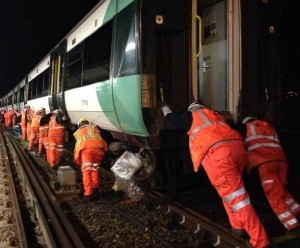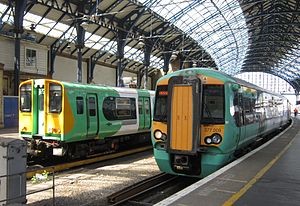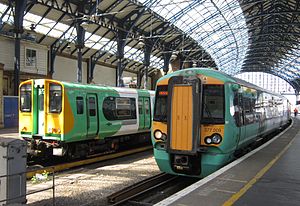The main train operator serving Brighton and Hove has been criticised by MPs from across the area in a House of Commons debate today (Wednesday 8 July).
One MP, quoting a constituent, said: “Southern rail services are beyond a joke for those of us who have to use them regularly.”
Caroline Lucas, the Green MP for Brighton Pavilion, said that commuters weren’t seeing any improvement and added: “They are fed up with the service they are seeing – not least the notorious 7.29am train that did not arrive on time once in a whole year.”
Simon Kirby, the Conservative MP for Brighton Kemptown, sat through the 90-minute debate in Westminster Hall but, as a government whip, did not take part.

He said afterwards: “I have been contacted by many constituents who have concerns with Southern.
“As a regular commuter myself, I understand the frustrations that many commuters feel with the service.
“Listening to other MPs in the debate, it is clear that the situation is the same in other constituencies.
“People living in Brighton Kemptown and Peacehaven who commute every day would like to see a dramatic improvement to the reliability of their train service.”
And Maria Caulfield, the Conservative MP for Lewes, who lives in Brighton where she previously served as a councillor, said that, as a commuter, she had also suffered the same problems.
She said: “I have also experienced elderly people, who cannot stand for the hour and 10 minute duration of the journey to London, being ticketed for being in first class.
“That is completely unacceptable when they have to stand because there are no seats for them in standard.

“I am trying to get better access to platforms and trains for people with mobility needs, whether people with a disability or young mums with pushchairs.
“I am also trying to get better carriages so more bicycles can fit on our trains and people can commute onwards after they get off their train.
“It is not good enough. It has an impact not only on people’s purses, as they have to pay for extra journeys, but on their quality of life.
“It should not be the case that people experience such a poor rail service just because of where they live.
“I welcome the initiatives the minister is trying to take but we need to see improvement soon.”
The main debate …
The debate was secured by Nick Herbert, the Conservative MP for Arundel and South Downs.
Mr Herbert said: “A large number of constituents … are absolutely fed up to the back teeth with Southern’s performance and want to see real action.
“In 2010 the figure for trains arriving on time was 90.8 per cent but this year the average is only 82.8 per cent although that figure has improved to 86.5 per cent in the second period of 2015-16.
“There may be some belated evidence of improvement in Southern’s performance. If that is true, it will be welcome but it must be locked in and sustained.”
Caroline Lucas intervened, saying: “I assure the right honourable gentleman that Brighton commuters certainly do not see any improvement on the Southern line.
“They are fed up with the service they are seeing – not least the notorious 7.29am train that did not arrive on time once in a whole year.
“He is eloquently taking the battle to the doors of Southern and Network Rail but does he not think that the government have a responsibility to look again at the whole franchise system?
“We have such a fragmented rail system. Time and again the rail network and the rail companies are not joined up.
“One problem that that creates is that we are simply not seeing the improvement that commuters and our constituents rightly expect.”

Mr Herbert said: “The honourable lady makes an interesting point. I do not choose to attack privatisation in itself which has resulted in significantly increased investment in the railways. There has been a huge increase in the number of passengers.
“However, given the split between the operating companies and the entity that owns the track and is responsible for signalling, effective co-operation between the two and effective communication to passengers are important.
“The very fact that I secured this debate singling out Southern is a reflection of the attitude that our constituents will have.
“First, they hold the train operating company accountable. The fact is that we need a joined-up service from the rail industry as a whole.
“The honourable lady rightly drew attention to the train of shame – the 7.29am from Brighton to Victoria which was late every single day of last year.
“I think that train ran on 140 days and it was never once on time. The Prime Minister himself was drawn to criticise that failure, saying that it was completely unacceptable.
“While we are discussing the Brighton service, I should mention that my honourable friend the member for Brighton Kemptown (Simon Kirby) is sitting patiently behind me listening to the debate.
“As a government whip he has taken a vow of silence but he feels equally strongly about Southern’s lamentable performance and the service it is delivering for his constituents.
“He wants to see improvements and I know that he has fought hard for them.
“I have dealt with how important it is for Southern to run a more punctual service.
“Secondly, there is the issue of overcrowding. It is unacceptable that commuters and others should so often have to endure an overcrowded service and be forced to stand for either part or the whole of a journey.

“The problems with Southern and Thameslink are exacerbated by trains that stop at Gatwick and pick up a large number of passengers which overcrowds the trains.
“In part, that is a reflection of the significant growth in passenger numbers, in which case services must be expanded to accommodate demand.
“Regular overcrowding is adding to the frustration of commuters and others with the service.
“Thirdly, all that is further exacerbated by the absence of timely information when there are problems with the service.
“The London Bridge improvement works have caused disruption and some of the consequential timetable changes have been very unpopular.
“There will be incidents that are beyond the control of the train operating companies or Network Rail.
“We all understand that such incidents – such as tragic accidents – will happen but the travelling public’s tolerance for them is completely stretched given that so many other incidents are within the companies’ control.
“When it is clear that the companies could deliver a better service, people’s anger about what happens repeatedly is exacerbated by the absence of proper information about what is going on.
“It may have been taking steps but Southern must get better at providing information, particularly when there is major disruption, so that people are able to get home.
“On (Thursday) 30 April, during the election campaign, my excellent research assistant travelled down from London Victoria to Arundel to deliver some casework to me.
“The journey took her five hours because of significant disruption on the line. One issue she mentioned was the absence of good information.
“Fourthly, the cleanliness of trains is a problem. A lot of the time, Southern trains are filthy despite the introduction of new rolling stock.

“It is appalling for commuters and others to have to sit in trains surrounded by discarded food.
“The loos are often either disgusting or out of service.
“The cleanliness of trains is, in part, the responsibility of those who use them. Too many people leave litter, food and so on but other companies are better at collecting it and ensuring that trains are clean.
“The situation adds to the poor quality of the service, and it is a constant complaint from my constituents.
“I pay tribute to the minister for her work to address the poor historical performance of Southern and Network Rail on the routes we are discussing.
“Along with other members, I met her before the election and she was already in the process of taking action.
“She chaired a meeting in the House between the Office of the Rail Regulator (ORR), Network Rail and Southern and an improvement plan was put in place.
“Not content with that, she took further action, convening another meeting immediately after the general election to demand further improvements. No doubt she will tell us about that when she responds.
“Nevertheless, those were remedial measures. To return to the point made by the honourable member for Brighton Pavilion (Caroline Lucas), we need arrangements in the rail industry that automatically ensure proper performance and do not require Members of Parliament to complain or ministerial intervention, however effective. That is not how the system is meant to run.
“That leads us directly to compensation. The right honourable member for Carshalton and Wallington (Tom Brake) was right to ask whether compensation arrangements are effective.
“Compensation kicks in only when trains are 30 minutes late and the arrangements are not very well known by the public.
“The take-up of compensation is low. According to the ORR, 68 per cent of passengers say that they have never claimed compensation, mainly because of a lack of awareness.
“In July 2013 Transport Focus found that 88 per cent of those eligible for compensation did not claim.

“One of the most effective ways in which we could sharpen the accountability of rail operating companies is by having more effective and automatic compensation arrangements so that the companies feel pain when they fail to deliver an adequate service for passengers.
“Compensation arrangements must be improved.”
Caroline Lucas said: “Does the right honourable gentleman agree that there should be some focus on the fact that when a delay is Network Rail’s fault, it has to give quite a lot of compensation to the rail operating companies but only a fraction of that is passed on to passengers?
“There is a real disproportionality between the amount of money the train companies get and what the passengers get. That ought to be looked at.”
Mr Herbert said: “The honourable lady makes a very good point.
“Owing to Southern and Network Rail’s poor performance and passenger experience, all the good things that have happened have, in passengers’ eyes, been negated. That is a pity.
“There has been £21 million of investment in new signalling on the Arun valley line which was meant to improve punctuality.
“The work at London Bridge will deliver improvements in future – no doubt the minister will talk about them – and is the result of £6 billion of investment.
“There are new trains on the line and no doubt staff are trying hard to improve the service.
“None of that, however, will count for anything unless Southern can get its act together and deliver a better service to passengers on a daily basis.
“The whole concept of the rail industry being in private ownership is being undermined by this company which is letting down not only its passengers but the very concept that a private company can deliver a decent utility to people in this country.
“It seems to me that that alone is a good enough reason for Southern to improve its performance.
 “In conclusion, the number of my constituents who have been complaining about Southern’s service has increased steadily over the past few years.
“In conclusion, the number of my constituents who have been complaining about Southern’s service has increased steadily over the past few years.
“People are absolutely fed up with the company’s performance but they are also fed up with excuses. They want real action to deliver a better service.
“There are signs that such action is being taken but it must be embedded and sustained.
“We need better arrangements to ensure that rail companies that fail to deliver pay the price and are held properly to account by the public.”
Tim Loughton, the Conservative MP for East Worthing and Shoreham, said: “Other honourable members have given the same reasons for complaint about the appalling service from Southern rail: poor timekeeping, cancellations, diversions, overcrowded trains, poor value for money, the rarity of refunds, the extraordinary coincidence that many delays seem to amount to 28 or 29 minutes – just below the 30-minute compensation threshold – and appalling communications when things go wrong.
“Problems are compounded for pedestrians as well. In my constituency, and in Worthing West, delays while level crossing barriers have been down have meant pedestrians and motorists having to wait for 48 minutes out of every hour in some cases.
“Commuters on trains are therefore not the only people affected.
“My constituents travel along the coastal strip – often having to change at Brighton – come into London and go to Gatwick Airport.
“If that airport is to be expanded, when the issue is finally decided, having a reliable rail service will be an essential factor but that is another argument for another day.”
He quoted a constituent who contacted him, saying: “I would like to know why the real-time train running app from Southern shows cancelled services as ‘running on time’.
“Southern rail services are beyond a joke for those of us who have to use them regularly.”
Shadow minister adds her voice
The Shadow Rail Minister Lilian Greenwood said: “The declining performance of Southern is clearly a cause of major frustration and, at times, real anger for the millions of commuters and occasional travellers who rely on its services.
“Even after hitting ever-lower ebbs, Southern’s performance has continued to deteriorate further.
“The facts are stark. Just 83 per cent of trains were on time in the past year – the worst annual punctuality rate in 15 years.
“Only 70 per cent of trains were on time during the morning peak when thousands of commuters struggle to find a seat on increasingly expensive and overcrowded trains.
“One in 20 trains were cancelled or seriously late.
“The operator reports some improvements in recent month, but overall Southern missed its punctuality targets by almost 5 per cent – the most significant gap between target and performance of any operator – which helped to trigger the regulator’s current investigation of Network Rail’s performance in 2014-15.
“Famously, of course, the 7.29am train from Brighton to London Victoria did not run to time on one single day last year.
“It is therefore not surprising that passenger satisfaction has fallen. As the right honourable member for Arundel and South Downs said, overall satisfaction is down by 10 per cent since 2010.

“Among commuters, less than a quarter of passengers say that they are getting value for money for their fares, which have risen by 23 per cent on average since 2010, as my honourable friend the member for Dulwich and West Norwood (Helen Hayes) noted.
“This is a world away from the standards that passengers expect and deserve.
“And we have all seen the disgraceful scenes at London Bridge station. The closure of tracks and platforms may be an unavoidable consequence of the £6.5 billion Thameslink project but the poor management of London Bridge station and the lack of information provided to passengers during periods of disruption are inexcusable.
“We also have to look at how Network Rail and the train operators work with one another.
“At a time when the planning of rail projects is under intense scrutiny, it is clear that that lack of adequate preparation cannot be allowed to happen again.
“When we look at the wider problems facing Southern, it is important to identify where responsibility lies.
“In spite of the best efforts of its engineering staff, Network Rail has not consistently provided reliable infrastructure services on this route over the last year and indeed the regulator has identified Southern as a franchise where ‘punctuality and reliability is below expectations’.
“I note, however, that 31 per cent of delays were attributed to the operator during the last year so it does not escape blame.
“It is clearly for Southern to address issues such as the cleanliness of trains and the provision of information to passengers – including about delays, cancellations and compensation – but there are also areas in which the government are directly accountable for the treatment of passengers.
“It is often asserted that ministers exercise influence through the franchising process but Southern will cease to function as a traditional franchise by the end of the month when it will join Thameslink and Great Northern under a single combined management contract.
“As the honourable member for Reigate (Crispin Blunt) noted, that contract gives the department (the Department for Transport) and ministers significant new powers over the operator, including in relation to the setting of fares.
“Last year the government confirmed their intention to remove gradually cheaper ‘Thameslink only’ tickets on the Brighton main line from 2016. The cost difference for annual season tickets to London was as much as £664.
“At the time the minister said: ‘When we move from two operators to one on the line … fares will be gradually equalised.’
“Will the minister confirm that that is still the government’s position and will she set out what level of fare rises commuters will face when they return to work in January?
“We have heard today that compensation arrangements need to be improved.
“The minister has previously indicated that she is willing to consider an automated system for awarding compensation when services are more than two minutes late.
“That would certainly be welcomed by passengers but it is worrying that the introduction of such a system appears to be explicitly tied to the franchising process.
“Does that mean that Southern passengers could have to wait until the early 2020s, when the next franchise will be awarded, before enjoying that benefit?
“Equally, the government could take action now to require train companies to provide cash compensation in contrast to the inflexible national rail vouchers that cannot be used online.
“Our understanding is that the Secretary of State could make that change by authorising a revision to the national rail conditions of carriage.
“Will the minister confirm that that is the case, and if so, why that authorisation has not yet been given?
“Similarly, the minister’s colleague, the Under-Secretary of State for Transport, the honourable member for Harrogate and Knaresborough (Andrew Jones), said that part-time season tickets – if they are ever created – will be implemented through franchise awards.
“Does that mean that Southern passengers could face a wait of at least six years before accessing those products even though part-time season tickets could save some commuters hundreds of pounds a year?
“If Southern is to accommodate growing demand, further infrastructure improvements are likely to be necessary.
“The operator is running 700 more trains a day than the route carried 20 years ago across some of the most complex and congested sections of the national rail network.
“There appeared to be cause for celebration in March when the Chancellor promised ‘a feasibility study into Brighton Main Line 2, speeding up journeys and relieving congestion’.
“However, the budget document itself mentioned only ‘a further study into reopening the Lewes to Uckfield rail line’ and not into the whole of Brighton Main Line 2.
“Will the minister say a bit more about whether the scope of that study will extend to the whole project or not?
“The reality is that the status of Network Rail’s whole investment programme is now unclear and is unlikely to be clarified before the end of the year.
“Ultimately, better services will require investment in improved infrastructure but Network Rail is facing enormous cost pressures on its enhancement, renewals and maintenance budgets.
“Will the minister confirm today that while passengers face delayed and cancelled trains, rising fares and cramped carriages, essential measures to improve their journeys are now in jeopardy?”
Helen Hayes, the Labour MP for Dulwich and West Norwood, said: “There has been a marked deterioration over the past three years which is a source of misery to many of my constituents, causing people to be late for work and to miss their children’s bedtimes.
“Constituents have got in touch to tell me that the unreliability of the service is making it difficult for them to hold down a job and they are frustrated that delays are often without any explanation at all.”
The minister replies
The Rail Minister Claire Perry said: “The worst thing about the whole situation would be to be that mother or father trying to get home to pick up their children from childcare and, month after month, week after week, day after day, being unable to say what time you will get home. That is an unacceptable burden on working families.
“Sorting out the route will deliver potentially the biggest productivity gain in the UK.
“The Southern route carries the second highest number of passengers. It is the biggest franchise.
“It will, as my honourable friends pointed out, be merging into the GTR (Govia Thameslink Railway) franchise at the end of the month.
“It has some of the oldest and most complicated track layout in the country. There is a reason why the upgrade works have not been done by successive governments. Some of the track is 176 years old.
“Doing this work is like doing open-heart surgery on a marathon runner. It creates delay – and misery when that delay becomes too great.
“There are serious lessons for the railway industry to learn about how works are done. Is it right to keep stations open and running or is it better to use a blockade and have all the pain at once?
“Those are very important questions and challenges for the industry.

“The work on the route is one of the largest investment programmes in the UK and it is contributing to the problem. It is not the sole cause.
“It is not just about London Bridge station. There is the new station at Blackfriars which has a wonderful layout and has added new capacity into the system.
“There is the introduction of new trains … So much is going on, but it is true that performance is often unacceptable and sometimes inexcusable.
“The majority of the time … the trains are on time. It is not all doom and gloom but we have got to a situation in which passengers have lost their trust in the operator and frontline staff have been left to deal with some unacceptable delay incidents themselves.
“It is not fun to work at London Bridge and not have the tools and information – to want to help deliver better performance for customers but be unable to do so – and to be spat at and abused.
“We should recognise that behind all these problems are often good people trying to do their best but lacking the tools to do so.
“I have heard consistent themes in the debate which I will try to address today. I am referring to reliability of service, communication and compensation.
“The reason why it is so important to get this right is that the government have an unprecedented investment plan for transport infrastructure over the next five years.
“It is not jam tomorrow. The new stations and new trains will be delivered.
“Demand has increased by more than 60 per cent in this part of the country and of course passengers have expectations of a better service now.
“People do not want to be shuffled around and not given information.
“There have already been some improvements. We have seen driver recruitment increase. One big challenge for Southern was that it did not take on enough drivers when it took on the franchise.
“Its driver recruitment plans are now running ahead of where it wanted to be.
“It is losing drivers as other parts of the network grow but it is recruiting. It is 50 per cent ahead of plan and training is proceeding apace. That is incredibly important.
“But this is not about the department getting involved and ministers trying to drive change.
“As has been said today, what we want is the industry to be able to do this itself. So what are the levers that we need to use?
“It is reassuring, I am sure, for honourable members to know that the chief executive of Network Rail, when he gave a presentation to the Department for Transport board, said that the recovery of the area of the country that we are debating was one of his top five priorities for this year.
“It is obvious to everyone that the system is creating millions of hours of misery for millions of people in one of the fastest-growing areas of the country.
“That is simply unacceptable and it is not good enough to have one-off interventions despite the fact that we have unprecedented levels of work going on.
“Understanding what matters to people now is crucial so let me outline some of the things that are happening and will happen.
“The merger is happening and that will bring in a raft of new performance measures that will hold to account those responsible a fair amount.
“Honourable members may know that the franchise is currently in breach of some of its performance measures and there has been a conversation with the department about the implications of that.
“Performance improvement plans were presented back in the spring … and are already starting to be implemented. That is driving the slow and steady improvement in performance.
“Beyond that, there are three main problems. The first is that delivering the London Bridge improvement programme will not solve all the problems on the lines in question, particularly the Brighton main line.
“The second is that although the public performance measure is improving, recovery from delays and the volatility of the service remain real challenges.
“As was mentioned by the honourable member for Brighton Pavilion (Caroline Lucas), who is no longer in her place, some trains are always late and that is simply not good enough.
“The third point is that rail customers – those who are paying for the goods and services – are consistently unhappy. They have lost trust. They do not see the improvements, and they do not think they will be sustained.
“So what has happened? Network Rail brought in its chief engineer to do a deep dive on the real underlying problems on the line from both an operations and an infrastructure point of view.
“That has been turned into a short-term and long-term plan for real recovery.
“I know we talk a lot about plans, recoveries and summits. There is a war room at London Bridge station that all honourable members are invited to visit with me on the 20th (Monday 20 July) … to see the depth of planning and understanding that is going on on a joined-up basis between Network Rail and the operator.
“We are not just telling ourselves that things are getting better. We are tracking social media sentiment and how people feel about their journeys.
“We are tracking what matters to people and what is actually improving for people.
“I want to mention some of the points that have been made about compensation.
“My honourable friend the member for Lewes (Maria Caulfield) made a valuable point. Compensation should almost never be paid, because we should have a system that delivers people to their destination on time.
“Members are right that it is estimated that only 12 per cent of people claim compensation.
“We have a manifesto commitment to deliver better compensation – and part-time season tickets – right across the industry.
“I continue to look at the problem of giving compensation to passengers from London Bridge. It is difficult because it is hard to target those passengers in a fairly open network but we continue to work on it.
“Ultimately, we have to have an unswerving commitment to and focus on passengers – customers – in the industry.
“The industry does so much right but when things go wrong, the fact that we have capped fares at RPI (rises at the same rate as the Retail Prices Index) for the remainder of this parliament almost does not matter, because people are frustrated about their journey.
“So I am determined, and the department is determined, to hold the industry to account.
“I am agnostic on the structure – whether this is done through an alliance or in another way. Whatever the structure happens to be, I just want better services to be delivered.
“I believe that the best way to do that is through transparency, a continued focus on quality in the franchising process and all of us being involved in holding the companies to account.”








I’d been interested to know how punctuality has improved to 86.5% in ‘the second half of 2015-16’ as stated by Nick Herbert when we’re barely into the second half of 2015?!!
The title of this article is very misleading – haven’t all the politicians made commented on the situation and criticized the TOCs and Network Rail.
Of course Caroline is back on her anti-capitalist band-wagon wanting to revert the railways to the “success” of the 70s where unions regularly held passengers to ransom.
Let’s see what ALL the local MPs (i.e. not just Brighton Pavilion) can do to improve the situation working with the TOCs without Caroline banging that sad old far-left drum…
The thing is those M.Ps don’t have to pay for their fares as it is reimbursed,so they should only be complaining on behalf of their constituents.
This bunch of over educated nutters (Tory’s) are only interested in the well off, stuff every one else
As you can see, the once locally well thought of Simon Kirby, has made himself near useless to his constituents by accepting the role of Whip. Time for a by-election.
I for one preferred the ability to use eVouchers, the new system means I MUST line up in a station to either buy a ticket or cash in the paper. Have you seen the line at Brighton Station ticket office? This is a huge step backwards and I’m sure will be a big saving to Southern as people like me won’t bother with the faff or letters, vouchers, lines and piddly change.